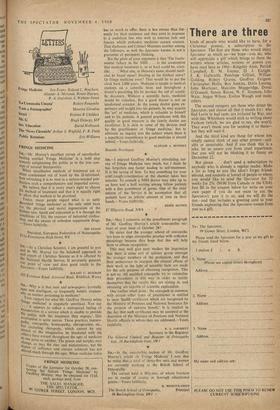S1R,__Why is it that men and newspapers, normally sane and
intelligent, so frequently babble irration- ally on matters pertaining to medicine? Your support for what Mr. Geoffrey Murray terms 'fringe medicine' is singularly uncritical. You say
• • • it appears to reflect a widespread feeling of exasperation at a service which is unable to provide the Public with the treatment they require.'• This assumption is quite untrue. These practices (naturo- pathy, osteopathy, homeopathy, chiropractice, etc., but excluding chiropody, which cannot by any stretch of the imagination be bracketed with the others) have existed throughout the ages of medicine in one guise or another. The priests and temples may Change, as may the rites and ministrations. but the degree of influence and success achieved has not altered much through the ages. When medicine today has so much to offer, there is less excuse than for- merly for their existence and they exist in response to a credulous few who wish to exercise fads and fancies which orthodox medicine cannot contain. That duchesses and Cabinet Ministers number among the followers, as well the Spectator knows. is not a guarantee of percipient thinking.
But the plum of your argument is that 'The funda- mental fallacy in the NHS . . . is the assumption that medical treatment is, or at least could be, scien- tific. . . .' What else, in Heaven's name,should medi- cine be based upon? Healing in the biblical sense? Or fringe medicine even? That would be to put the clock back 2,000 years. Medicine is taught to medical students on a scientific basis and throughout a doctor's practising life he invokes the aid of scienti- fic discovery. Without a scientific basis, medicine would be valueless. But a good doctor is not an unadorned scientist. As the young doctor gains ex- perience and insight into his patients, he may acquire the 'art' of medicine, which is valuable to himself and to his patients. A general practitioner with this quality in good measure is the family doctor par excellence. It is akin to some of the devices used by the practitioners of 'fringe medicine,' but to advocate an inquiry into the subject where there is a superficial resemblance to good medicine is absurd indeed.—Yours faithfully,
Rounds, Northants
ALASTAIR A. MCINNES














































 Previous page
Previous page